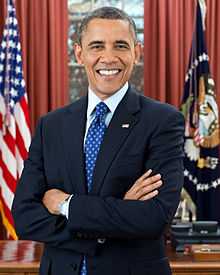Cabinet of the United States
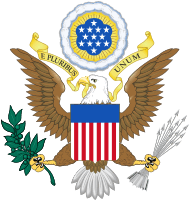 |
| This article is part of a series on the politics and government of the United States |
|
Executive
|
|
Politics portal |
The Cabinet of the United States is composed of the most senior appointed officers of the executive branch of the federal government of the United States, who are generally the heads of the federal executive departments. The existence of the Cabinet dates back to the first President of the United States, George Washington, who appointed a Cabinet of four persons: Secretary of State Thomas Jefferson; Secretary of the Treasury Alexander Hamilton; Secretary of War Henry Knox; and Attorney General Edmund Randolph to advise him and to assist him in carrying out his duties.
All Cabinet members are nominated by the President and then presented to the Senate for confirmation or rejection by a simple majority. If they are approved, they are sworn in and then begin their duties. Aside from the Attorney General, and the Postmaster General when it was a Cabinet office, they all receive the title of Secretary. Members of the Cabinet serve at the pleasure of the President, which means that the President may dismiss them or reappoint them (to other posts) at will.
In federal law and the Constitution

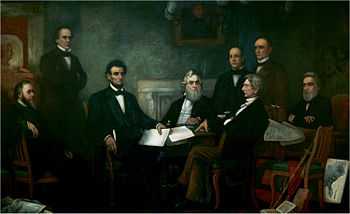
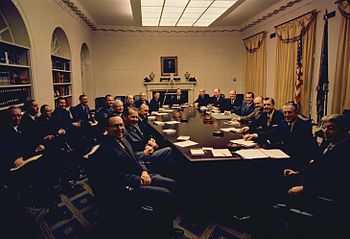







There is no explicit definition of the term "Cabinet" in either the United States Constitution, the United States Code, or the Code of Federal Regulations. The name comes from a 17th-century usage for a private room where advisors would meet, which developed into the modern sense of a council of advisors.[1]
The term "principal Officer in each of the executive Departments" is mentioned in Article II, Section 2, Clause 1, and the term "Heads of Departments" is mentioned in Article II, Section 2, Clause 2. The term "principal officers of the executive departments" is also mentioned in the Twenty-fifth Amendment, Section 4. The executive departments are listed in 5 U.S.C. § 101. Although there are occasional references to "Cabinet-level officers," which when viewed in their context do refer to these "principal officers" and "heads of departments," the terms "principal officers" and "heads of departments" are not necessarily synonymous with "Cabinet" members.
In 3 U.S.C. § 302 with regard to delegation of authority by the President, it is provided that "nothing herein shall be deemed to require express authorization in any case in which such an official would be presumed in law to have acted by authority or direction of the President." This pertains directly to the heads of the executive departments as each of their offices is created and specified by statutory law (hence the presumption) and thus gives them the authority to act for the President within their areas of responsibility without any specific delegation.
Under 5 U.S.C. § 3110, federal officials are prohibited from appointing their immediate family members to certain governmental positions, including those in the Cabinet. Passed in 1967, this law was a congressional response in delayed dismay about John F. Kennedy's appointment of his brother Robert F. Kennedy to the office of the Attorney General.
Salary
Cabinet officials receive an amount of pay determined by Title 5 of the United States Code. According to 5 U.S.C. § 5312, Cabinet level positions qualify for Level I pay, which was set at an annual salary of $199,700 in 2011. Some Cabinet-level officials, including the Vice President and the White House Chief of Staff, have their salaries determined differently.
Meetings
For the first 175 years of its existence, the Cabinet as a body would meet frequently, sometimes several times a week. These were so important that they continued to be held in the absence of President Woodrow Wilson while he was away in France during the Versailles conference, leading to the inclusion of the Vice President for the first time. During the administrations of Lyndon Johnson and Richard Nixon, the frequency of meeting declined, and by the end of the latter's administration, months would pass between sessions.
An expanded White House staff has taken over many of the functions of the Cabinet as a body.
Current Cabinet and Cabinet-level officials
The individuals listed below were nominated by President Barack Obama to form his Cabinet and were confirmed by the United States Senate on the date noted. An elected Vice President does not require Senate confirmation, nor does the White House Chief of Staff, which is an appointed staff position of the Executive Office of the President.
Cabinet
The Cabinet officers are listed in rank order according to the United States presidential line of succession:
| Office (statutory basis) |
Incumbent | Term began |
|---|---|---|
 Secretary of State (22 U.S.C. § 2651a) |
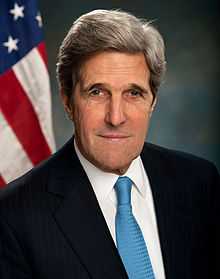 |
February 1, 2013 |
 Secretary of the Treasury (31 U.S.C. § 301) |
 |
February 28, 2013 |
 Secretary of Defense (10 U.S.C. § 113) |
 |
February 17, 2015 |
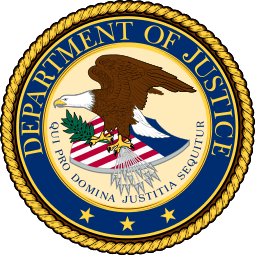 Attorney General (28 U.S.C. § 503) |
 |
April 27, 2015 |
 Secretary of the Interior (43 U.S.C. § 1451) |
 |
April 12, 2013 |
 Secretary of Agriculture (7 U.S.C. § 2202) |
 |
January 20, 2009 |
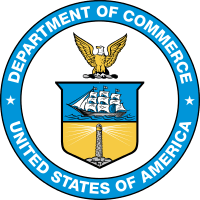 Secretary of Commerce (15 U.S.C. § 1501) |
 |
June 26, 2013 |
 Secretary of Labor (29 U.S.C. § 551) |
 |
July 23, 2013 |
 Secretary of Health and Human Services (Reorganization Plan No. 1 of 1953, 67 Stat. 631 and 42 U.S.C. § 3501) |
 |
June 9, 2014 |
 Secretary of Housing and Urban Development (42 U.S.C. § 3532) |
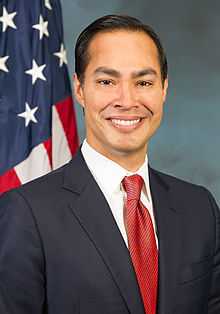 |
July 28, 2014 |
 Secretary of Transportation (49 U.S.C. § 102) |
 |
July 2, 2013 |
 Secretary of Energy (42 U.S.C. § 7131) |
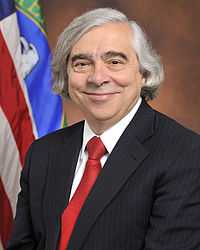 |
May 21, 2013 |
 Secretary of Education (20 U.S.C. § 3411) |
 |
January 20, 2009 |
 Secretary of Veterans Affairs (38 U.S.C. § 303) |
 |
July 30, 2014 |
 Secretary of Homeland Security (6 U.S.C. § 112) |
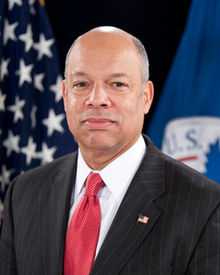 |
December 23, 2013 |
Cabinet-level officers
| Office | Incumbent | Term began |
|---|---|---|
 Vice President |
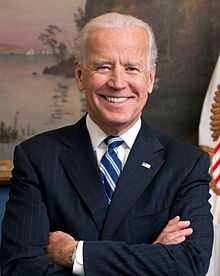 |
January 20, 2009 |
 White House Chief of Staff |
 |
January 25, 2013 |
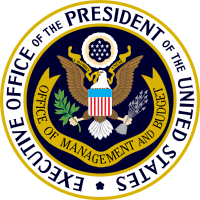 Director of the Office of Management and Budget |
 |
July 28, 2014 |
 Administrator of the Environmental Protection Agency |
 |
July 18, 2013 |
 Trade Representative |
 |
June 21, 2013 |
 Ambassador to the United Nations |
 |
August 2, 2013 |
 Chairman of the Council of Economic Advisers |
 |
August 2, 2013 |
 Administrator of the Small Business Administration |
 |
April 7, 2014 |
Former Executive and cabinet-level departments
- Department of War (1789–1947), headed by the Secretary of War: renamed Department of the Army by the National Security Act of 1947.
- Department of the Navy (1798–1949), headed by the Secretary of the Navy: became a military department within the Department of Defense.
- Post Office Department (1829–1971), headed by the Postmaster General: reorganized as the United States Postal Service, an independent executive agency.
- National Military Establishment (1947-1949), headed by the Secretary of Defense: created by the National Security Act of 1947 and recreated as the Department of Defense in 1949.
- Department of the Army (1947–1949), headed by the Secretary of the Army: became a military department within the Department of Defense.
- Department of the Air Force (1947–1949), headed by the Secretary of the Air Force: became a military department within the Department of Defense.
Renamed heads of the executive departments
- Secretary of Foreign Affairs: created in July 1781 and renamed Secretary of State in September 1789.[2]
- Secretary of War: created in 1789 and was renamed as Secretary of the Army by the National Security Act of 1947. The 1949 Amendments to the National Security Act of 1947 made the Secretary of the Army a subordinate to the Secretary of Defense.
- Secretary of Commerce and Labor: created in 1903 and renamed Secretary of Commerce in 1913 when its labor functions were transferred to the new Secretary of Labor.
- Secretary of Health, Education, and Welfare: created in 1953 and renamed Secretary of Health and Human Services in 1979 when its education functions were transferred to the new Secretary of Education.
Other positions no longer of cabinet rank
- Director of the Federal Security Agency (1939–1952): Abolished, most duties transferred to the Department of Health, Education, and Welfare
- Director of the Federal Emergency Management Agency (1996–2001): created as an independent agency in 1979, raised to Cabinet rank in 1996,[3] and dropped from Cabinet rank in 2001.[4]
- Director of Central Intelligence (1995–2001)[5][6][7]
- Director of the Office of National Drug Control Policy (1993–2009)[8][9]
Proposed Cabinet departments
- U.S. Department of Commerce and Industry (proposed by business interests in the 1880s)
- U.S. Department of Agriculture and Labor (proposed by members of U.S. Congress)
- U.S. Department of Peace (proposed by Congressman Dennis Kucinich, Senator Matthew Neely, and other members of the U.S. Congress)[10]
- U.S. Department of Public Welfare (proposed by President Warren Harding)
- U.S. Department of Natural Resources (proposed by former President Herbert Hoover, the Eisenhower administration, 1976 GOP national platform,[11] and Bill Daley as a consolidation of the Departments of the Interior, Energy, and the EPA.)[12]
- U.S. Department of Social Welfare (proposed by President Franklin Roosevelt)
- U.S. Department of Public Works (proposed by President Franklin Roosevelt)
- U.S. Department of Conservation (proposed by Interior Secretary Harold L. Ickes)
- U.S. Department of Urban Affairs (proposed by President John F. Kennedy)
- U.S. Department of Business and Labor (proposed by President Lyndon Johnson)
- U.S. Department of Community Development (proposed by President Richard Nixon; to be chiefly concerned with infrastructure)
- U.S. Department of Human Resources (proposed by President Richard Nixon; essentially a revised Department of Health, Education, and Welfare)
- U.S. Department of Economic Development (proposed by President Richard Nixon; essentially a consolidation of the Departments of Commerce and Labor)
- U.S. Department of Environmental Protection (proposed by Senator Arlen Specter)
- U.S. Department of International Trade (proposed by the Heritage Foundation)
- U.S. Department of Global Development (proposed by the Center for Global Development and others)
- U.S. Department of Culture (proposed by Quincy Jones)[13]
- U.S. Department of Business (proposed by President Barack Obama)[14]
- U.S. Department of Intelligence (proposed by former DNI Mike McConnell)[15]
See also
- Confirmations of Barack Obama's Cabinet
- Black Cabinet
- Kitchen Cabinet
- List of United States Cabinets
- List of female United States Cabinet Secretaries
- List of African-American United States Cabinet Secretaries
- List of foreign-born United States Cabinet Secretaries
- List of United States political appointments that crossed party lines
- List of people who have held multiple United States Cabinet-level positions
- List of people to hold U.S. Cabinet Secretaryships for ten years or more
- Living former members of the United States Cabinet
- St. Wapniacl
References
Notes
- ↑ Harper, Douglas. "cabinet (n.)". Online Etymology Dictionary. Archived from the original on 2011-12-18. Retrieved 31 March 2015.
Meaning "case for safe-keeping" (of papers, liquor, etc.) is from 1540s, gradually shading to mean a piece of furniture that does this. Sense of "private room where advisors meet" (c.1600) led to modern political meaning (1640s); perhaps originally short for cabinet council (1630s); compare board (n.1) in its evolution from place where some group meets to the word for the group that meets there.
- ↑ The office of Secretary of Foreign Affairs existed under the Articles of Confederation from October 20, 1781 to March 3, 1789, the day before the Constitution came into force.
- ↑ "President Clinton Raises FEMA Director to Cabinet Status" (Press release). Federal Emergency Management Agency. February 26, 1996. Retrieved May 22, 2009.
- ↑ Fowler, Daniel (November 19, 2008). "Emergency Managers Make It Official: They Want FEMA Out of DHS". CQ Politics. Retrieved March 3, 2010.
During the Clinton administration, FEMA Administrator James Lee Witt met with the Cabinet. His successor in the Bush administration, Joe M. Allbaugh, did not.
(Archived by WebCite at http://www.webcitation.org/5ny13zsIv) - ↑ Tenet, George (2007). At the Center of the Storm. London: HarperCollins. p. 136. ISBN 0-06-114778-8.
Under President Clinton, I was a cabinet member—a legacy of John Deutch's requirement when he took the job as DCI—but my contacts with the president, while always interesting, were sporadic. I could see him as often as I wanted but was not on a regular schedule. Under President Bush, the DCI lost its Cabinet-level status.
- ↑ Schoenfeld, Gabriel (July–August 2007). "The CIA Follies (Cont'd.)". Commentary. Retrieved May 22, 2009.
Though he was to lose the cabinet rank he had enjoyed under Clinton, he came to enjoy "extraordinary access" to the new President, who made it plain that he wanted to be briefed every day.
- ↑ Sciolino, Elaine (September 29, 1996). "C.I.A. Chief Charts His Own Course". New York Times. Retrieved May 22, 2009.
It is no secret that Mr. Deutch initially turned down the intelligence position, and was rewarded for taking it by getting cabinet rank.
- ↑ Clinton, Bill (July 1, 1993). "Remarks by the President and Lee Brown, Director of Office of National Drug Control Policy". White House. Retrieved May 22, 2009.
We are here today to install a uniquely qualified person to lead our nation's effort in the fight against illegal drugs and what they do to our children, to our streets, and to our communities. And to do it for the first time from a position sitting in the President's Cabinet.
- ↑ Cook, Dave (March 11, 2009). "New drug czar gets lower rank, promise of higher visibility". Christian Science Monitor. Retrieved March 16, 2009.
For one thing, in the Obama administration the Drug Czar will not have Cabinet status, as the job did during George W. Bush's administration.
- ↑ "History of Legislation to Create a Dept. of Peace".
- ↑ Republican Party Platform of 1976, August 18, 1976;The American Presidency Project; http://www.presidency.ucsb.edu/ws/?pid=25843
- ↑ Thrush, Glenn (November 8, 2013). "Locked in the Cabinet". Politico. Retrieved November 18, 2013.
- ↑ Clarke, Jr., John (January 16, 2009). "Quincy Jones Lobbies Obama for Secretary of Culture Post". Rolling Stone. Retrieved August 19, 2010.
- ↑ "Obama Suggests 'Secretary of Business' in a 2nd Term - Washington Wire - WSJ". The Wall Street Journal.
- ↑ J. Stapelton Roy (June 29, 2007). "A Conversation with Michael McConnell". Council on Foreign Relations. Retrieved January 9, 2013.
Further reading
- Bennett, Anthony. The American President's Cabinet. Houndmills, Basingstoke, Hampshire: Macmillan, 1996. ISBN 0-333-60691-4. A study of the U.S. Cabinet from Kennedy to Clinton.
- Grossman, Mark. Encyclopedia of the United States Cabinet (Santa Barbara, California: ABC-CLIO; three volumes, 2000; reprint, New York: Greyhouse Publishing; two volumes, 2010). A history of the United States and Confederate States cabinets, their secretaries, and their departments.
- Rudalevige, Andrew. "The President and the Cabinet", in Michael Nelson, ed., The Presidency and the Political System, 8th ed. (Washington, D.C.: CQ Press, 2006).
External links
| Wikimedia Commons has media related to Cabinet of the United States. |
- Official site of the President's Cabinet
- U.S. Senate's list of cabinet members who did not attend the State of the Union Address (since 1984)
| ||||||||||||||||
| ||||||||||
| ||||||||||
| ||||||||||||||||||||||||||||||||||||||||||||||||||||||||||||||||||||||||||||||
| ||||||||||||||||||||||||||||||||||||||||||
| ||||||||||
